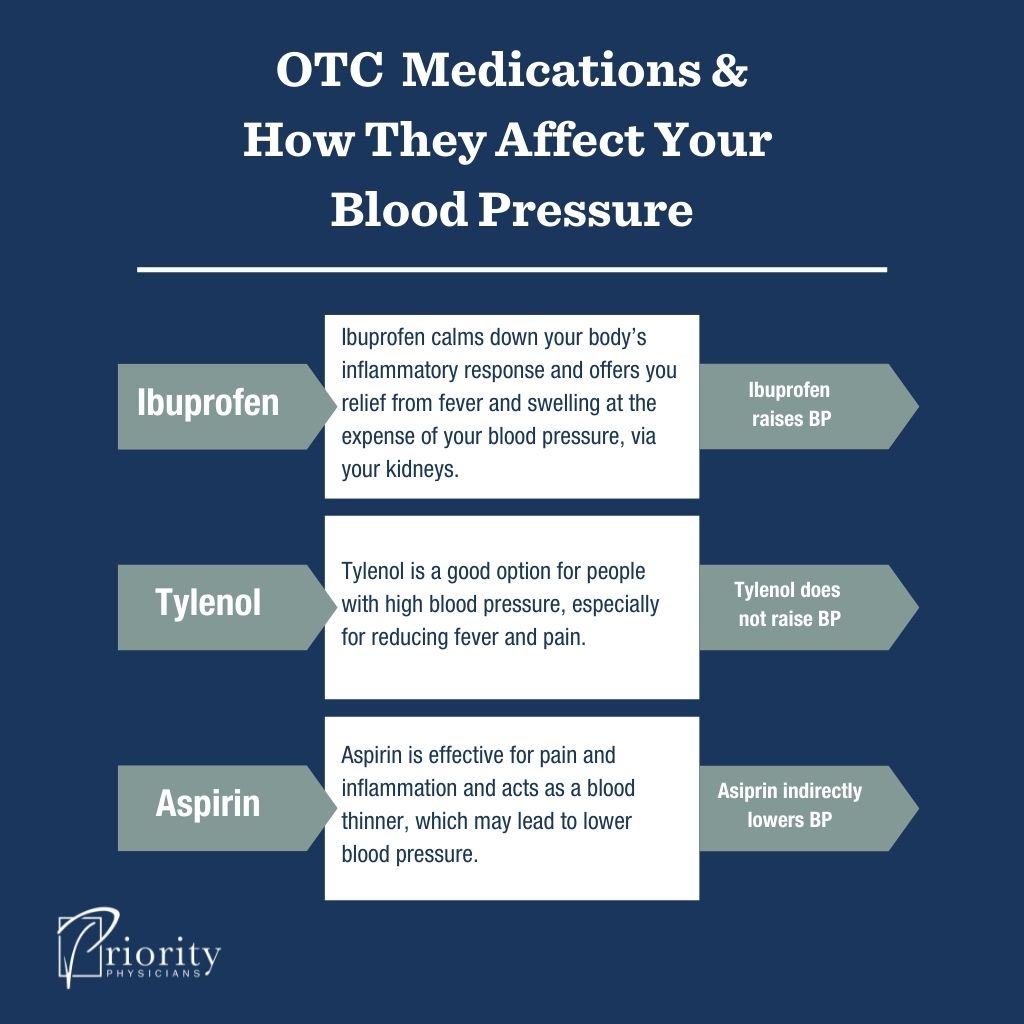All medications have positive effects, negative effects, and interactions. The positive effects are what the drug is intended to do, the negative effects are the unintended side effects, and interactions involve how medications affect each other when taken together.
One area where this can be a problem is with blood pressure and cold medicine. Almost half of U.S. adults have high blood pressure (hypertension), and several common over-the-counter (OTC) medications can affect it.
If you’re on blood pressure medication or are prone to hypertension, it’s important to be aware of how everyday medications can affect your blood pressure. Here’s what you need to know.
Common Medications and Blood Pressure
On average, U.S. adults get two to three colds per year. This means many people on blood pressure medication are also taking cold medications.
Interactions. The good news on drug interactions is that any severe interactions should be listed on the box or insert of your blood pressure medication. You can also check with your doctor or pharmacist, or with an online drug interactions checker. These steps should help you avoid cold medicine interactions with your blood pressure medication.
Side effects. Many cold medications are vasoconstrictors, which means they cause your blood vessels to constrict. This is great for your runny nose or cough, but it’s bad if you have hypertension because vasoconstriction increases blood pressure.
If you’ve been told you have high blood pressure, regardless of whether you’re taking medication for it, talk to your doctor about taking any other medications, even something as simple as a painkiller. Together, you and your doctor can assess your health and decide if the drug is safe for your particular situation.
Let’s look at a few of the most common OTC cold medications and their effect on blood pressure.

Does Ibuprofen Raise Blood Pressure?
Ibuprofen is the generic name for Advil or Motrin, and it’s a non-steroidal anti-inflammatory drug (NSAID). Another similar drug is naproxen, better known by its brand name, Aleve.
When you’re sick, inflammation is part of your body’s natural response to infection. You release white blood cells into your bloodstream that go out to destroy the bacteria or virus making causing your illness. This response usually results in swelling and fever.
Anti-inflammatories help to relieve these symptoms, but drugs like naproxen and ibuprofen also restrict blood flow to your kidneys. Your heart then works harder to pump blood to your kidneys and, voilà, you get elevated blood pressure. With long-term or heavy use, these drugs can even cause kidney damage.
So while ibuprofen calms down your body’s inflammatory response and offers you relief from fever and swelling, it does so at the expense of your blood pressure, via your kidneys.
Takeaway: Does ibuprofen raise blood pressure? Yes.
Does Tylenol Raise Blood Pressure?
Tylenol, also known by the generic name acetaminophen, is a fever reducer and painkiller. But unlike ibuprofen, it is not an anti-inflammatory.
When you take Tylenol to reduce fever and relieve pain, it doesn’t affect your blood pressure because it’s filtered through the liver, not the kidneys. Your liver doesn’t influence blood pressure like your kidneys do, so your pain is blocked without the same risk. However, taking too much Tylenol at one time can result in liver damage, so you should always follow the directions on the packaging.
Tylenol is a good option for people with high blood pressure, especially for reducing fever and pain. It may not be as effective for symptoms that involve swelling, such as a sore throat.
Takeaway: Does Tylenol raise blood pressure? No.
Does Aspirin Lower Blood Pressure?
The answer here is less straightforward. It isn’t a clear yes or no, though some evidence shows that aspirin does lower blood pressure indirectly.
Aspirin is also an NSAID that’s effective for pain and inflammation, but it works completely differently from ibuprofen or acetaminophen. Additionally, aspirin acts as a blood thinner that many people take to prevent the blood clots that cause heart attacks and strokes. It’s this blood-thinning action that may lead to lower blood pressure.
Aspirin is the subject of much ongoing research, and the results are somewhat confusing. We don’t currently advise taking aspirin solely for the purpose of lowering blood pressure. Aspirin recommendations change all the time, so it’s important to talk to your doctor about whether this is an appropriate drug for you.
Takeaway: Does Aspirin lower blood pressure? Not directly.
Do Decongestants Raise Blood Pressure?
Decongestants like Sudafed are the medications that will raise your blood pressure the most. Like ibuprofen, decongestants work through vasoconstriction to relieve nasal stuffiness. They can also increase your heart rate and potentially interfere with your blood pressure medication. Because of this, people with high blood pressure will generally want to avoid taking decongestants.
If you have a bad cold as well as high blood pressure, it’s best to avoid decongestants and manage your symptoms in other ways. If you take a multi-symptom cold medication, be sure to check the label; many of these medicines contain a decongestant.
Takeaway: Do decongestants raise blood pressure? Yes.
Coricidin HBP: Possible Alternative?
Coricidin HBP is a common cold medicine developed for people with high blood pressure. It doesn’t affect blood pressure because it doesn’t contain vasoconstrictors. Instead, it works through a combination of antihistamines and cough suppressants.
That being said, the most common feedback we get from patients who take Coricidin HBP is that it doesn’t work well for symptom relief.
Takeaway: Does Coricidin HBP affect blood pressure? No, but it might not affect cold symptoms either.
Other Ways to Manage Cold Symptoms
Besides taking a pain reliever like Tylenol that alleviates symptoms without affecting your blood pressure, you can also try some drug-free tips to help you feel better faster.
- Saline nasal sprays and rinses can help flush out congestion.
- Lozenges, menthol sprays, and warm herbal teas can soothe scratchy throats.
- Drinking lots of clear fluids helps your body clear phlegm and mucus.
- Extra rest helps your body fight the cold and recuperate.
Make Sure Your Doctor Knows What Medicines You’re Taking
Since medications affect each other and your body in different ways, it’s important for your doctor to know about all drugs you’re taking, even the OTC ones. Always keep a list of which medications you take and talk to your doctor before starting any new medicine or supplement.
Check the Label
Ibuprofen, naproxen, acetaminophen, and aspirin are used in hundreds of medications, and just because something’s not in the name on the box doesn’t mean it’s not in the drug formula. For example, Excedrin contains acetaminophen and sometimes aspirin. Some types of Mucinex and all types of Theraflu contain acetaminophen and a decongestant. Always check the labels and consult your doctor.
Weigh the Risks and Benefits
The stress of feeling sick and not getting good rest is hard on your body. Bad cold symptoms can even make you miserable enough to raise your blood pressure.
When you talk with your doctor, weigh the risks and benefits of taking a certain cold medication against the risks of not taking it. There’s no one right answer for everyone. Only you and your doctor can decide what’s best in your situation.

